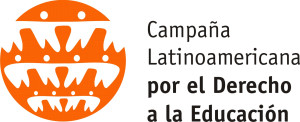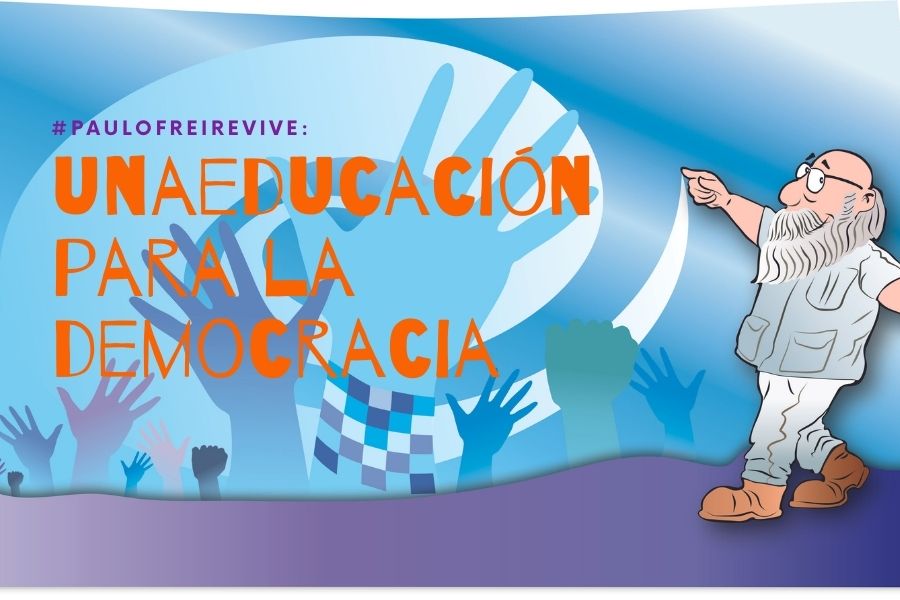
Paulo Freire´s Centenary: his legacy as educator is vital for strengthening Y&AE for democracy
September 1, 2021During September, the Latin American Campaign for the Right to Education (CLADE) developed a campaign through communication, awareness and dialogue activities in order to remember the importance of the legacy of the Brazilian educator Paulo Freire and reaffirm our option and struggle for a liberating education that strengthens democracy and promotes social transformation, towards a more just, equitable, sustainable and peaceful world.
CLADE is a plural network of civil society organizations, with presence in 18 Latin American and Caribbean countries and, from its founding moment, has assumed the thought and pedagogy of Paulo Freire as one of its main principles for the struggle for the human right to education in the region.
Emancipatory education, critical thinking, the transformation of educational environments and relationships into spaces for the collective construction of knowledge, reading of contexts, search for alternatives and transforming actions within the horizon of democracy, have been at the core of CLADE’s strategic work.
Within this framework and having in mind the centenary of Paulo Freire, celebrated on September 19, CLADE, articulated with the Latin American and Caribbean Campaign in Defense of Paulo Freire’s Legacy, organized by the Council for Popular Education in Latin America and the Caribbean (CEAAL), developed a month of communication, awareness and dialogue actions, to recall the importance of Freire’s legacy for the guarantee of an emancipating and critical education, which strengthens democracies in our continent and around the world.
Each week of the month, starting on September 3, CLADE members conducted and disseminated webinars, messages and materials in various formats shared through social media and other channels, as well as interviews and conferences, in order to highlight different concepts related to Freire’s legacy for the realization of an emancipatory and democratic education.
The last week of the campaign, from September 25 to 30, highlighted activities and messages about Freire’s legacy for the guarantee of Youth and Adult Education (Y&AE) as a key fundamental human right to promote sustainable development, human rights and, with them, our democracies.
In this framework, the Platform of Regional Networks for Youth and Adult Education in Latin America and the Caribbean, of which CLADE is a member, together with the Latin American Association of Popular Education and Communication (ALER), CEAAL, the International Federation Fe y Alegría (FIFyA), the Network of Popular Education Among Women in Latin America and the Caribbean (REPEM) and the International Council for Adult Education (ICAE), with the sponsorship of DVV International and Open Society Foundations, held a webinar on September 30, from 17h to 19h (Brazil time, GMT-3), to take up, disseminate and discuss the struggles, demands and proposals of the subjects and activists of Y&AE in Latin America and the Caribbean, on the way to the International Conference on Adult Education (Confintea) VII, which will take place in 2022 in Morocco.
The event, addressed, among other aspects, the importance of Freire’s legacy for the guarantee of Y&AE as a human right, popular and transformative education in the Freirean perspective and the situation of Youth and Adult Education in Latin America and the Caribbean in the context of pandemic.
See below de record of this event in English:
Freire’s contributions to Y&AE: towards sustainable development and social and environmental justice
Inspired by Paulo Freire’s perspectives and teachings, and with Confintea VII on the horizon, members of the Regional Networking Platform for Y&AE in Latin America and the Caribbean advocate for a new Y&AE, which should be popular, free, secular, inclusive, emancipatory and transformative. An education that shouldn’t have colonial, sexist, patriarchal and racist features.
In front of welfare and remedial approach that is usually given to Y&AE, we defend that this educational modality must be of quality, with cultural and social relevance. In front of onslaught of tendencies that attempt to privatize education, the right to Y&AE must be guaranteed free of charge. Their homogenizing vision must be overcome with the conception of Y&AE based on the valuation and exercise of education in its multiple expressions. From this point of view, Y&AE not only has a high educational value, but is also a commitment to the transformation of reality, to the change of social structures. Faced with different forms of discrimination and exclusion of a structural nature, this educational modality must contribute to lay the foundations for our societies, which shouldn´t be colonial, patriarchal and racist.
In times in which the motivations for continuing studies, mainly of people over 15 years of age, have been transformed and go far beyond the fulfillment of academic training needs, the priority of Y&AE should be community, permanent and popular education because it is carried out with and in all areas where human beings develop their activities. Furthermore, it takes community processes as the basis for educational objectives and is committed to the process of popular movements and the overcoming of all forms of oppression. Thus, Y&AE should stop concentrating on formal education and give priority to non-formal and popular education, promoting the social construction of knowledge in communities that foster intercultural, intergenerational and intersectoral encounters.
From this perspective, which is in line with Freire’s thought, the new understandings of Y&AE are based on conceiving human beings as subjects of education capable of producing the urgent and necessary changes for the construction of a more just and sustainable society.
For these reasons, and in compliance with the principles of lifelong education, governments should recognize education throughout life and for the diversity of the population as a human right, guaranteeing its full functioning through public policies, institutions and pertinent resources. Literacy, being the basis for the continuity and completion of studies, mainly of the sectors with higher levels of vulnerability, in current times, requires a broad and diverse vision and educational offer that guarantees the continuity of studies at all levels and areas of the educational systems, overcoming the traditional basic literacy approaches, recognizing learning developed in daily life and developing educational processes from the culture and mother tongue.
On the other hand, assuming the challenges of the current context of multiple crises and the effects of COVID-19 pandemic on the daily life of humanity, we propose to rethink an Y&AE whose principles should be the following: education to create harmonious relationships among human beings, community and mother earth, to enjoy health with integral well-being, and to contribute to develop a resilient society, which preserves the existence of all living beings; a liberating and transforming Y&AE, as part of social and popular movements and as a political-educational strategy and project, in such a way that people and communities become active subjects of the required transformations of the planet; education for the construction of a society free of all kind of discrimination, inequality and exclusion; a community and democratic Y&AE, for coexistence, participatory democracy and socio-community participation; an education based on social justice and political, social, cultural, economic and environmental rights of individuals, peoples and nature.
In other words, we defend an education and Y&AE for the encounter among cultures, that overcomes inequalities derived from colonialism, for intercultural dialogue and revaluation of collective knowledge. Based on Freire’s legacy, the transformative education we need, to build the world we want, is one that guarantees the right to know and the accumulated knowledge of humanity and science, with its use for the benefit of all people, from critical pedagogies and cultural dialogue for global citizenship, the defense of rights, peace, common goods and the care of our common home.
>> Read more in our regional statement towards Confintea VII (available in Spanish).
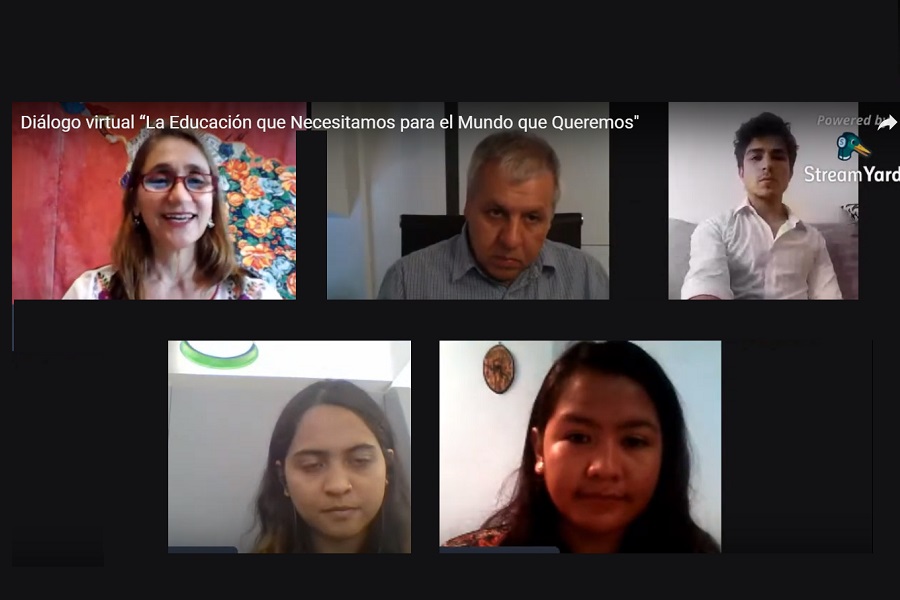
Experts and youths talk about the right to education in Latin America and the Caribbean
March 16, 2020“The Education We Need for the World We Want: views from adolescents and youths in Latin America and the Caribbean” was the title of the virtual conversation held by the Latin American Campaign for the Right to Education (CLADE), with the participation of youths and authorities from Latin America and the Caribbean, who stressed challenges and proposals to ensure the right to education in this region.
(more…)
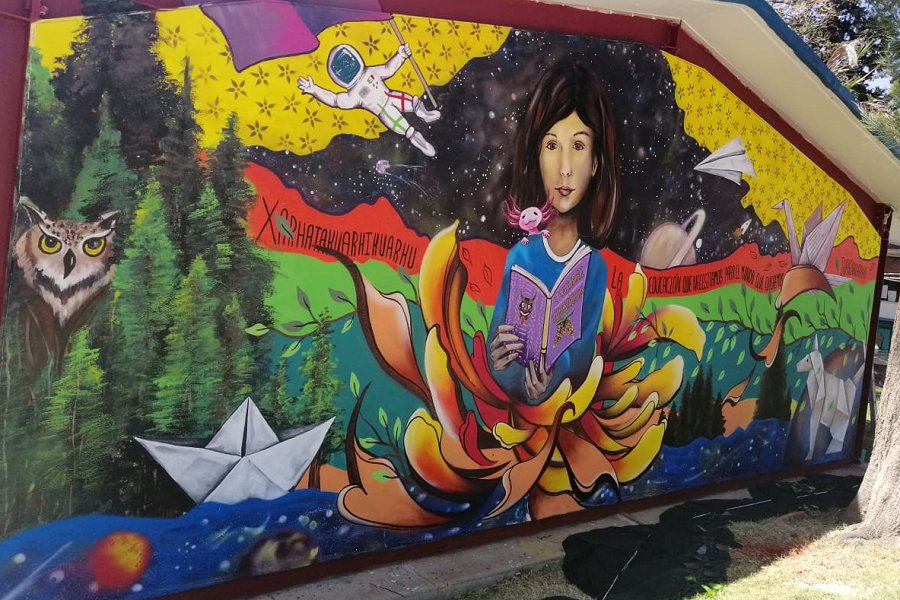
A mural on #TheEducationWeNeed painted in Mexican school
March 10, 2020
As part of the regional campaign #TheEducationWeNeed for the world we want, carried out from Oct. 2019 to Mar. 2020, students, artists and teachers joined at the Preparatory School Profesor Melchor Ocampo, located at the city of Morelia, in the State of Michoacán, Mexico, to paint a mural in which they present the expectations and opinions of adolescents and youths on the right to education.
The mural was conceived during a conversation with Michoacanian artists Bethel Cucue and Alain Silva, from Cherán community. In the final version of the mural, it not only shows the participation of the students and their dialogues on their right to education, but also their ideas, emotions, dreams and concerns, as well as the particular identity of each of them.
To find out more about this action, the Latin American Campaign for the Right to Education (CLADE) talked to the school’s cultural coordinator, Paulina Mojica, and two of the students who took part in this activity: 17-year-old Brandon Vargas and 16-year-old Yafeth Ulises Soto.
“We tried to register in a mural our ideas on the #LaEducaciónQueNecesitamos para el mundo que queremos campaign slogan and by that to inspire more students to keep growing personally and professionally”, affirmed Yafeth.
Read the full interview below:
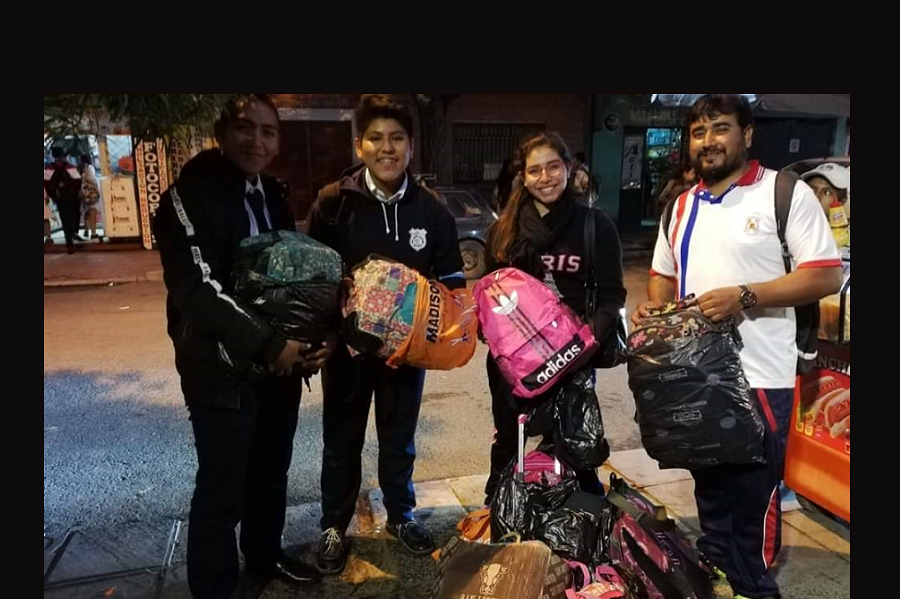
Inspired by his experience of CLADE’s initiative, young man starts campaign in Bolivia
March 9, 2020“The campaign #TheEducationWeNeed had the positive change of encouraging us students to insist in being heard all the time, and even more when it is much more strongly needed and much more important, because education is power”, affirmed Gabriel Villarpando, a final year Law student and a member of the Bolivian Campaign for the Right to Education (CBDE), at the region of Tarija, Bolivia.
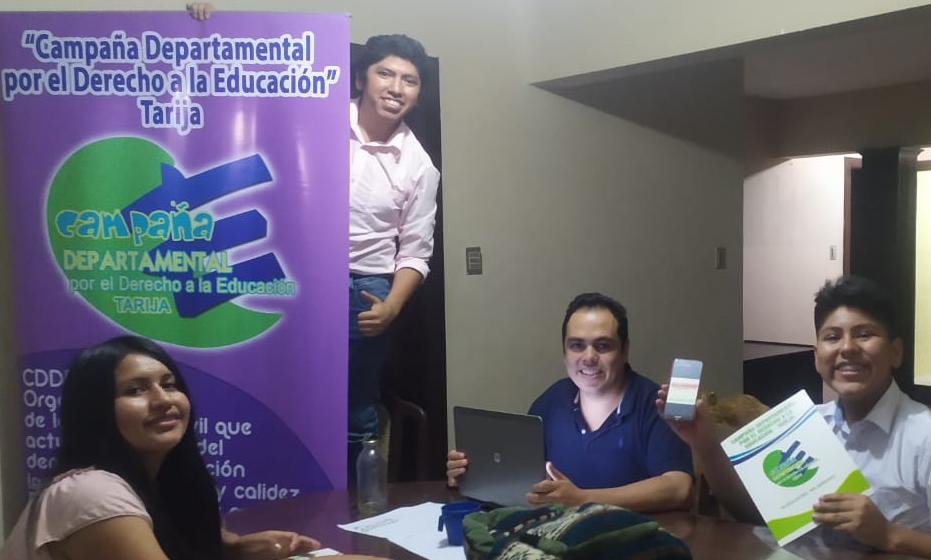
24-year-old Gabriel Villarpando was one out of more than 50 young people and adolescents that took part in
#TheEducationWeNeed for the world we want initiative, carried out between Oct. 2019-Apr. 2020, with the purpose of encouraging adolescents and youths from Latin America and the Caribbean to share their expectations and opinions on the right to education.
After experiencing #TheEducationWeNeed, Gabriel started the #Mochila2.0 [#Backpack2.0] campaign, aimed at fostering conversations on the right to education and, in turn, collecting backpacks that stopped being used and distributing them to students who need them.
The collected backpacks will be distributed next week to rural communities and [people] in situation of vulnerability in the region of Tarija and then the students receiving these donations will be interviewed and filmed, expressing their opinions and suggestions on the right to education.
“The education we need is emacipatory, equitative and inclusive education. An education that can have an effect, that is accessible, that is, that education exists everywhere”, affirmed Villarpando.
In the conversation below, Gabriel explains the #Mochila2.0 campaign and comments on his experience of joining #TheEducationWeNeed initiative and on the importance of emancipatory education for adolescents and youths.
¿What is #Mochila2.0 iniciative?
Gabriel Villarpando – This initiative consists in the possibility of collecting backpacks no longer used, to be recycled so other people going to school can use them.
The idea is to encourage students and parents to donate backpacks that are being put aside. Initially, we collected them and soon we will be donating them to encourage indigenous land workers who are out of the city, who live in rural areas [to go to school]. For them it is much more difficult to get new school materials every year, such as, in this specific case, backpacks. We want to bring this campaign to encourage students from indigenous peoples in the fields, starting with the students from the people Weenhayek.
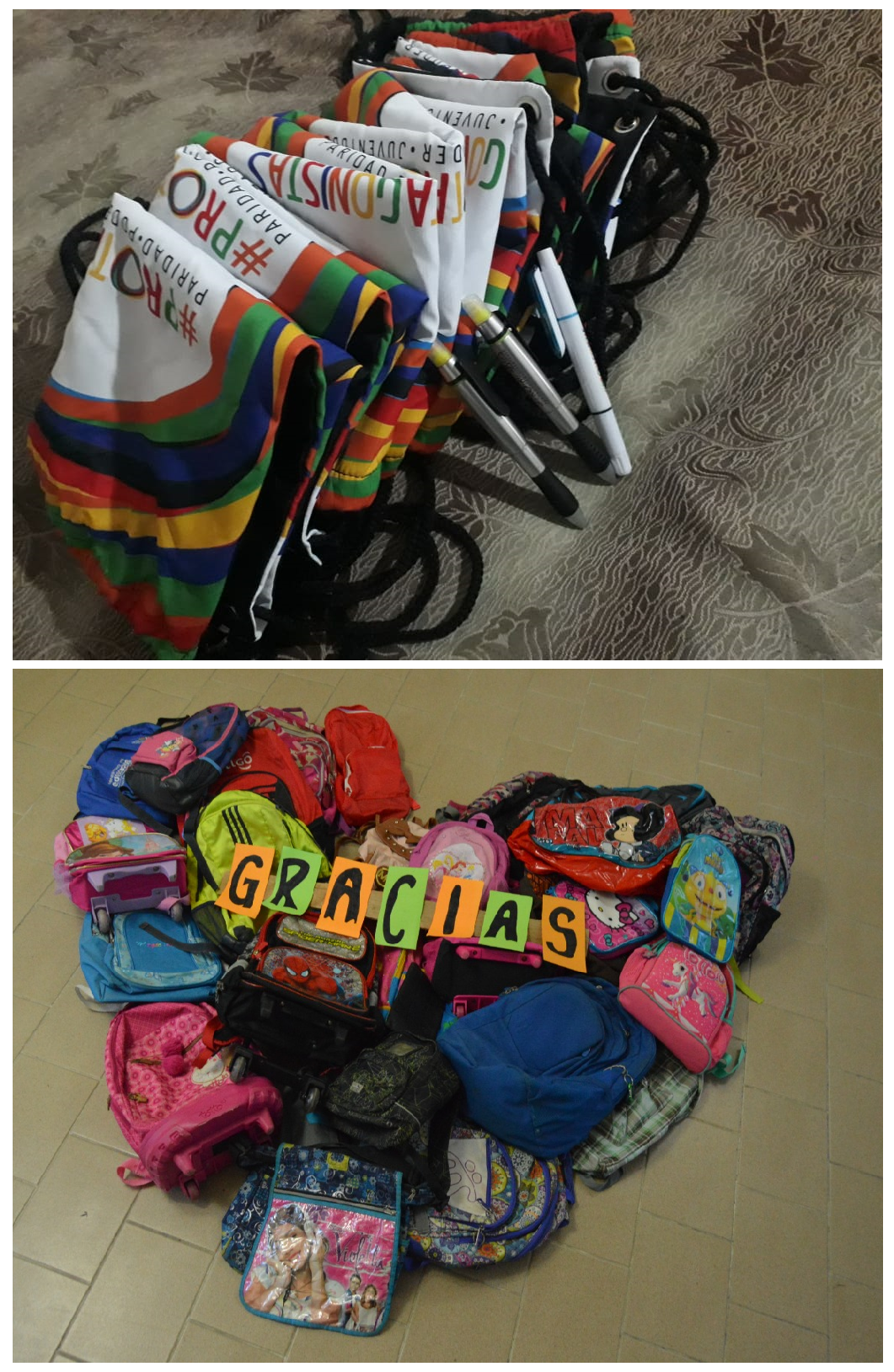
How is it evolving?
Gabriel Villarpando – We shared a call through the education centers that joined the campaign or that are working with us as a team and also through the secondary students’ federation. Besides, we have a group working as the initiative’s coordination team, named Unidos en Acción [Acting Together].
This campaign was officially launched in February 8, with [the participation of] education centers.
Where does such an idea come from?
Gabriel Villarpando – This idea comes from thinking how useful such a school material, the backpack, can be for our students, because we need to carry our notebooks, pencils and other school materials everyday to our education centers. The backpack helps us to transport all our materials much more easily.
Everything really came from this thoughs, because for indigenous peoples it’s very difficult to be have the conditions to afford or renew their school material every year, in this case the backpack, since they live in rural areas and there is not much commerce there. They also have to go to the city and many of these families are really humble, and if they manage to get to the city —what doesn’t happen so frequently—, it is for buying essential goods, such as food and other groceries.
Many students from indigenous peoples don’t even have a backpack, many carry their notebooks and pencils in their hands. We saw a problem and a necessity is this regard, and we wanted to create the campaign #Mochila2.0 to encourage these students [to go to school].
In what moment was it connected to #TheEducationWeNeed for the world we need for the world we want campaign?
Gabriel Villarpando – Well, the campaign is actually connected to the concept of promoting the full exercise of the right to education as a human right and to officialize and promote public policies which can cooperate to the generation of a change towards the education we need, opening the way to having a better world as a result.
This is why we encourage the donation of the backpacks put aside, being used again these goods can generate a change so students can keep going to their school centers, alleviating the difficulties in their school life, especially considering they live far away or in the rural area. In that sense, our campaign wanted to remind the 30th anniversary of the UN Convention on the Rights of the Child [celebrated on November 20, 2019].
For you, what is the #EducationWeNeed for the world we want?
Gabriel Villarpando – The education we need is emacipatory, equitative and inclusive education. An education that can have an effect, that is accessible, that is, that education exists everywhere, giving priority to schools in rural areas, because many students walk for hours to attend their education centers. So this is why it has to be inclusive, accessible and this is the education we need.
Do you consider to develop other activities in regards to the same subject or initiative?
Gabriel Villarpando – Of course we do, because the most important is that this campaign setting will result in the possibility of articulating and advocating to our authorities, people, decision-makers to generate public policies in benefit of the defense of the right to education.
Could you identify any positive change after having taking part in the campaign #TheEducationWeNeed?
Gabriel Villarpando – Of course I can. It was very important to get to listen to the voices of the [education] leading actors, such as the students, and the empathy they generated in the process of sharing their experiences, their livingness, to demand or socialize the education we need for the world we want.
“The campaign #TheEducationWeNeed had the positive change of encouraging us students to insist in being heard all the time, and even more when it is much more strongly needed and much more important, because education is power”
The role it plays to generate public policies or to demand that this right is NOT vulnerated is really important. It even encourages us students to get involved in this advocacy plan to be developed, with all our demands and needs in regards to the field of education
Especially, in this stage of transition or political crisis Bolivia is going through, around the new elections for our country’s president.
What we see is the #TheEducationWeNeedcampaign had the positive change of encouraging us students to insist in being heard all the time, and even more when it is much more strongly needed and much more important, because education is power”
Would you like to add anything else?
Gabriel Villarpando – This campaign was officially launched on February 8, with [the participation of] education centers. Nevertheless, I hope you can join this campaign, disseminating it and sharing it with your student friends or colleagues at all levels, so we can reach more people and also encourage other civil society organizations, coalitions or platforms in defense of education to join and replicate this kind of initiative.
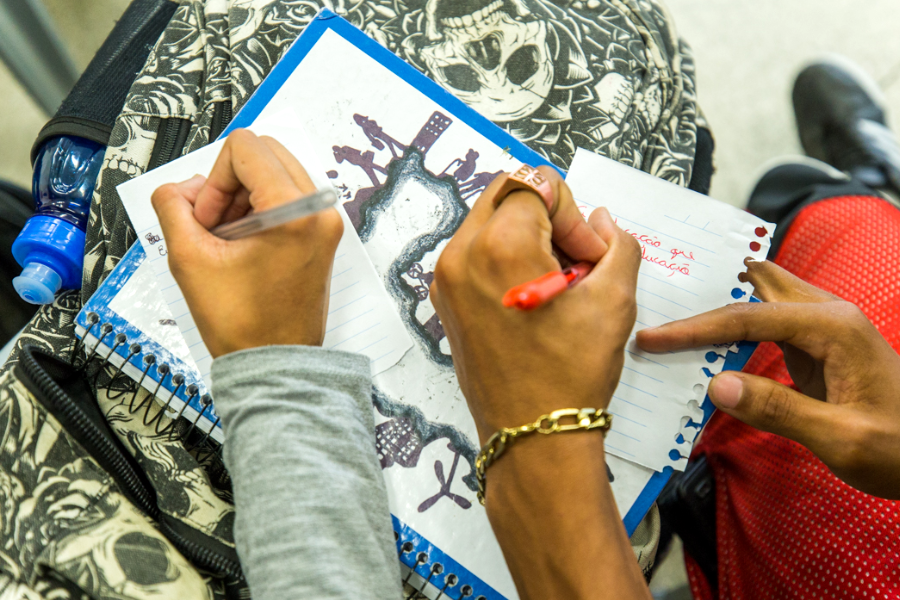
Adolescents and youths share their views on the education they want for a better world
December 19, 2019The initiative #TheEducationWeNeed for the world we want is aimed at mobilizing adolescents and youths in Latin America and the Caribbean, inviting them to tell us what education they need for a better world and the most important demands from their countries.
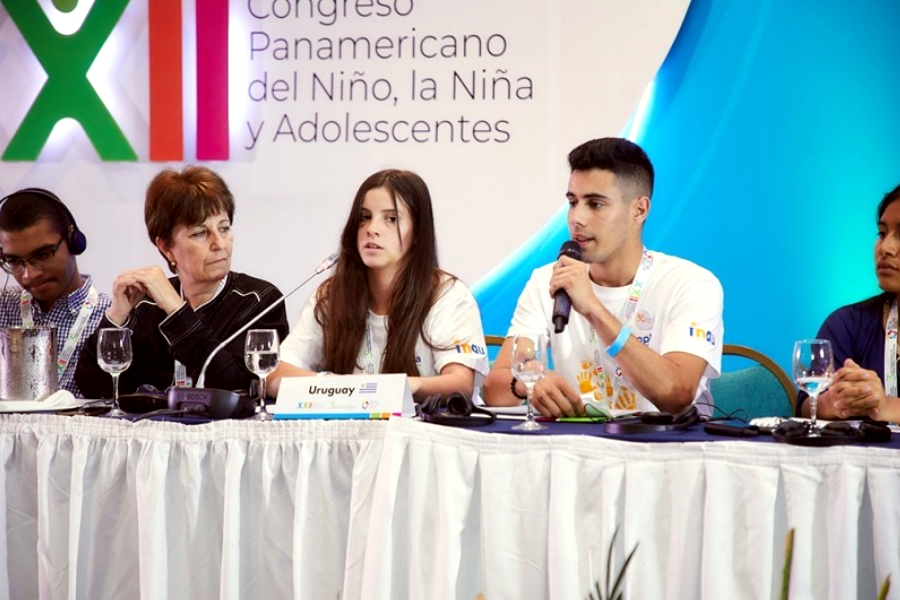
What are Latin America and Caribbean students’ thoughts on education and other human rights?
November 11, 2019Overcoming discrimination and violence, the right to play, art and recreation, gender equality and the right to comprehensive sexuality education and to participate in the debates on public policies affecting them: these were some of the demands shared by boys, girls, adolescents and youths during the 22nd Pan-American Child Congress and the Third Pan-American Child Forum that were held from Oct. 29-31 in Cartagena (Colombia).
(more…)
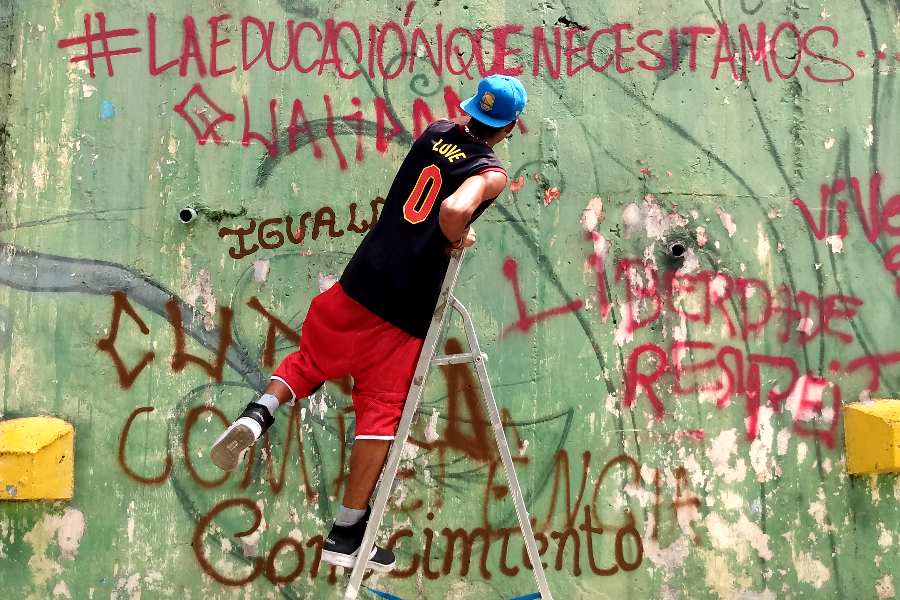
Students from Sao Paulo discuss the education they need for the world they want
November 4, 2019initiative “The education we need for the world we want”, CLADE was last Thursday, Oct. 31, at the Public School Professora Maria Augusta Corrêa, in Sao Paulo, Brazil. This public education center is one of the most diversified in the city, with a high percentage of migrant students, especially from Bolivia and Haiti.
(more…)
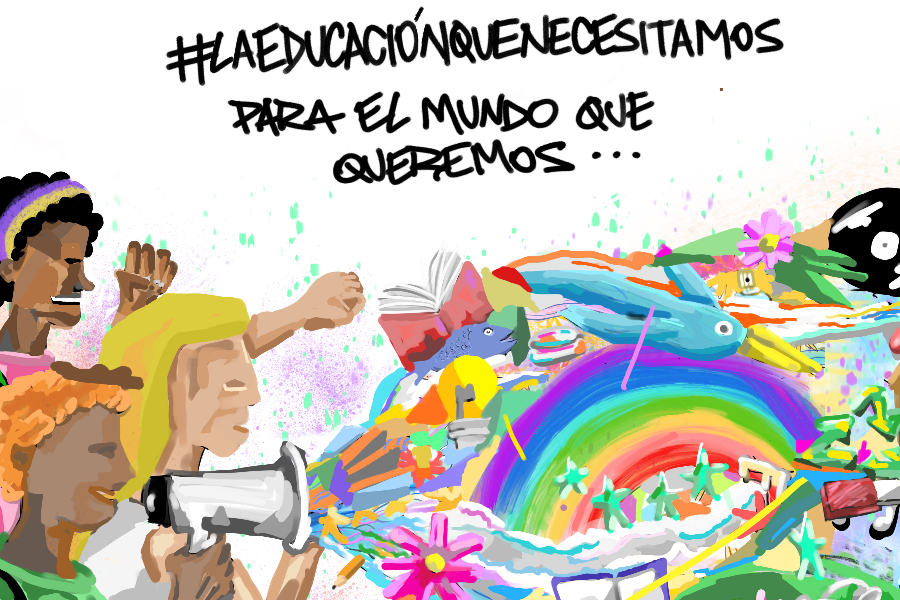
Youths from Latin America and the Caribbean invited to express what #TheEducationWeNeed is
October 30, 2019Partnering with young people and secondary school and university students from different countries in Latin America and the Caribbean, and with the support of the UNICEF Regional Office, CLADE promotes the initiative “#TheEducationWeNeed”
(more…)
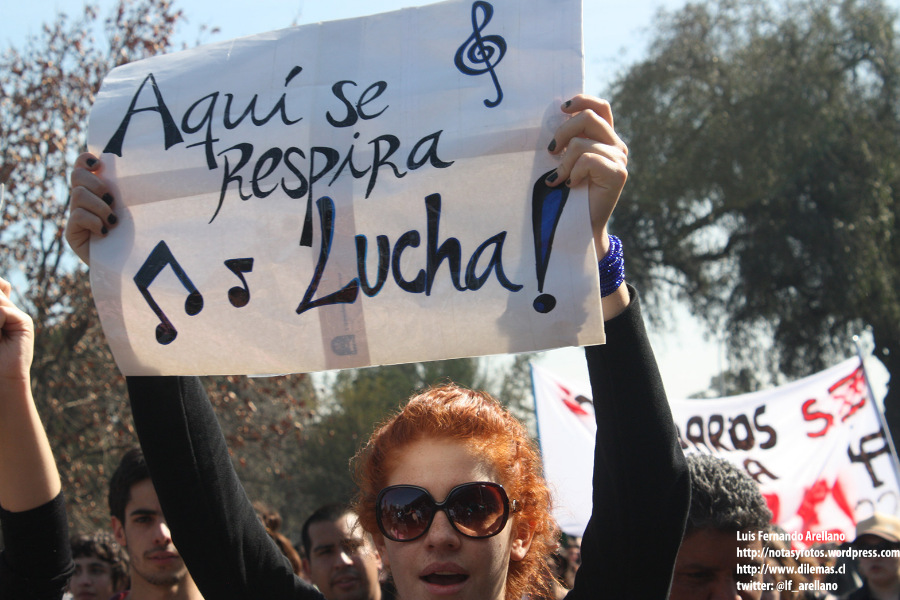
Youth from Latin America and the Caribbean transforming education
August 12, 2019In 1999, United Nations General Assembly appointed August 12 as the International Youth Day, an annual celebration aimed at promoting the role of youth in processes of change, as well as raising awareness on the challenges and contexts faced by young people.
(more…)





